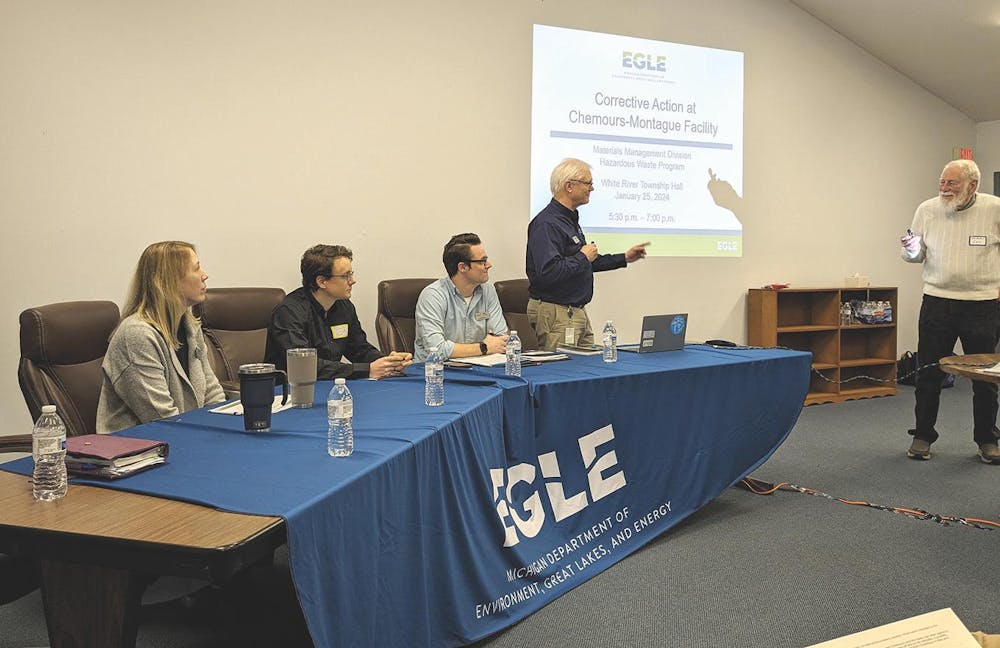MONTAGUE — The White River Township Hall was filled last Thursday evening with people seeking information from the state Department of Environment, Great Lakes and Energy (EGLE) about the ongoing efforts to clean up the former DuPont site now administered by Chemours.
In addition to many concerned citizens, several elected officials were at the presentation, including state senator Jon Bumstead, state representative Curt VanderWall, county commissioner Kim Cyr, and the mayors of both Whitehall and Montague - Steven Salter and Tom Lohman. Also in attendance were members of the Whitehall and Montague city councils and a Fruitland Township trustee.
EGLE outlined the steps it has taken and will continue to take to engage in a cleanup at the site, which is still seeing the effects of a DuPont factory that was on the site from the 1950s through 1996. Most notably, piles of lime remain in Mirror Lake, and the Chemours Environmental Impact Committee (CEIC) continues to be concerned about aquatic life at the site.
Through a diagram, EGLE noted it is doing studies to determine the corrective measures necessary, and Elizabeth Garver, an EGLE enforcement officer, noted that Chemours and EGLE came to an agreement finalizing the language of an enforceable Corrective Action Consent Order (CACO) in December, adding the document was over 40 pages long. However, CEIC has since submitted an official request to intervene, which must be addressed before the CACO can take effect. Once it is set to take effect, there will be a public hearing, the site of which will be local but is not yet determined, regarding the CACO. Once a date is determined, there will be a period during which public comment can be submitted, spanning 30 days prior to the hearing and 15 days after it.
CEIC’s Claire Schlaff, who was described as “the bones of” the organization by another member during the presentation, noted during the public comment period that CEIC learned from Traverse City-based environmental group For Love of Water that it could request input on the CACO, hence the move. Schlaff added in an email to the Mirror that CEIC originally believed it could not intervene prior to the CACO’s enaction and originally approached FLOW hoping for a say in cleanup decisions before learning it was in fact allowed to intervene.
Schlaff told the Mirror that CEIC will look to acquire legal representation to “help us wade through” the new territory it now finds itself in. She said those looking to help CEIC with associated costs can make donations to the Muskegon County Environmental Coordinating Council (MCECC), a 501(c)3 nonprofit working with CEIC.
Throughout the public comment period, citizens expressed frustration that work has not been done sooner at the Chemours site; Whitehall councilwoman Tanya Cabala said she was told at a 1989 meeting with DuPont that Mirror Lake would be cleaned up, and it still has not yet happened. EGLE’s Ronda Blayer fielded many of those inquiries and said laws governing steps EGLE is allowed to take have only been on the books since 1996 and that it can only do what it has legal authority to do.
Also during the public comment period, multiple citizens, as well as county water resources commissioner Brenda Moore, asked if the Pierson drain will be part of EGLE’s cleanup work. EGLE said it would investigate the drain to determine any needed rehabilitation efforts.
During the presentation, EGLE’s Sam Cairns discussed a drone survey he conducted at the site. He noted such surveys would normally have been able to come up with a good idea of how much lime was at the site, but due to some unrelated changes in elevation in the area, this survey was less effective at that. He said Chemours estimated about 540,000 cubic yards of lime remain at the site.
Much more information, including a timeline of EGLE activities with regard to the site, is available at the EGLE website by doing a web search for ‘EGLE Chemours corrective action.’












